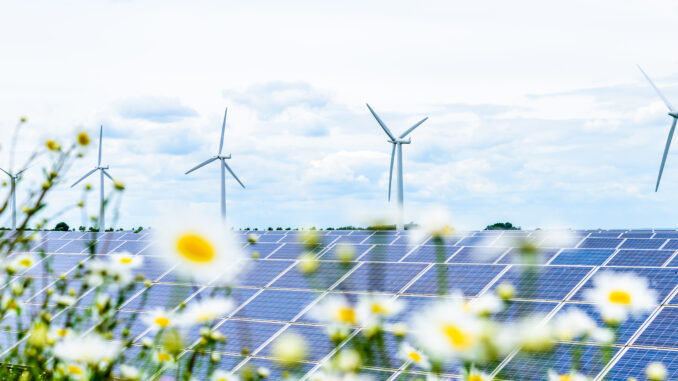
New Public Consultation Finds Majorities of MD-8 Residents From Both Parties Agree on Federal Measures Encouraging Transition to Clean Energy
Rep. Raskin Attends Citizen Panel Forum Discussing Topic and Districtwide Findings with Constituents
Majorities of both Republicans and Democrats in Maryland’s 8th Congressional District agree on federal proposals to provide tax incentives for clean energy and energy-saving alternatives; require electric companies to have a minimum portion of their electricity from renewable sources; and institute a carbon fee and rebate plan, according to a survey conducted by the Program for Public Consultation (PPC) at the University of Maryland’s School of Public Policy.
The survey results were released and discussed at a new kind of town hall called a Citizen Panel Forum that included Congressman Jamie Raskin and constituents who took the online survey. Designed to give the public a more effective voice in the policymaking process, Thursday’s Citizen Panel Forum was convened by three nonpartisan organizations: Civic Genius, Voice of the People, and the University of Maryland’s Program for Public Consultation. It is the second Citizen Panel Forum held with Congressman Raskin and residents of the 8th district.
At the forum, Congressman Jamie Raskin said, “It is very important to me to be apprised of the findings here. When we did it last time on democracy and electoral reform issues, it was extremely valuable to me to have data informing what my intuitions are. I spend all my time talking to people in the community, but that does not necessarily mean it is systematic or scientific. This process deepens my understanding of where my constituents are.”
The survey, conducted with a representative sample of the district’s residents, found that bipartisan majorities in the district favor a number of proposals under consideration in Congress that:
- Institute tax credits encouraging people and companies to adopt clean energy or energy-saving technologies (details on public support for each tax credit)
- require that electric companies have a minimum portion of their electricity come from renewable sources (MD-8 overall 78%, Republicans 60%, Democrats 90%)
- require newly built cars and light trucks, by 2027, to get 20-30% more miles per gallon (MD-8 overall 78%, Republicans 68%, Democrats 86%)
- charge a fee per ton of carbon dioxide emissions on companies that produce coal, oil or natural gas (also known as a carbon tax), and distribute all the revenue to citizens as a monthly rebate check (MD-8 overall 73%, Republicans 55%, Democrats 81%)
- provide extra support to coal workers who are losing their jobs due to the transition to clean energy (MD-8 overall 84%, Republicans 75%, Democrats 89%)
“Clearly, there is far more bipartisan common ground among the citizens of Maryland 8th district than in Congress on how to both address environmental concerns and produce energy,” commented Steven Kull, Director of PPC.
“This is not just another town hall,” said Jillian Youngblood, executive director of Civic Genius. “Citizen Panel Forums lift up a critical message for communities and Members of Congress: Americans agree on plenty and we can craft actionable solutions by listening to the people.”
Large majorities of MD-8 residents support proposals that encourage people and companies to adopt clean energy or energy-saving technologies. For example, 85% (Republicans 74%, Democrats 94%) favor providing a tax credit for up to 50% of the cost of installing an electric vehicle charging station that can be used by anyone. Large majorities also support tax incentives for energy-saving improvements to residential buildings, such as offering a tax credit of up to $1,500 for installing a new energy-efficient heating or air conditioning system (MD-8 overall 80%, Republicans 75%, Democrats 83%).
The 518 residents surveyed went through an online policymaking simulation designed to put citizens in the shoes of a policymaker. Respondents are provided a briefing, presented with pro and con arguments, and then asked to weigh in with their specific recommendations. The content was reviewed in advance by experts on all sides of the issue to assure accuracy and balance.
The views expressed in Maryland’s 8th District are similar to those in nationwide surveys with samples of more than 2,000 voters provided by Nielsen Scarborough.
Energy and Environment Questionnaire with MD-8 and U.S. National Frequencies:
https://vop.org/wp-content/uploads/2022/04/EE-MD8-Quaire0322.pdf
Energy and Environment Survey Slides with MD-8 and U.S. National Results:
https://vop.org/wp-content/uploads/2022/04/EE-Slides-MD8-040722.pdf
Members of the public can go through the same policymaking simulation at:
https://survey.alchemer.com/s3/6809783/Energy-Environment-MD8
Spanish speakers can go through the same policymaking simulation at: https://survey.alchemer.com/s3/6813978/Raskin-Clean-Energy-Spanish-no-event


Be the first to comment